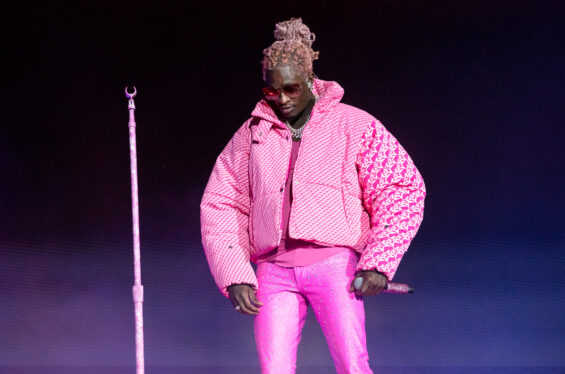This is The Legal Beat, a weekly newsletter about music law from Billboard Pro, offering you a one-stop cheat sheet of big new cases, important rulings and all the fun stuff in between.
This week: A judge issues a ruling in the Hall & Oates lawsuit after the dispute turns public and personal, Young Thug’s RICO trial gets underway in Atlanta with opening statements and witness testimony, Kelly Clarkson wins a California labor law ruling against her ex-husband, and much more.
THE BIG STORY: Hall v. Oates Goes Public
The mysterious legal battle among Hall & Oates got a lot clearer last week – with detailed filings from each artist, a hearing in open court, and a judge’s ruling on how the case will proceed.
To catch you up: After a decades-long, highly-lucrative musical partnership, Daryl Hall sued John Oates last month in Nashville court. The case was initially filed under seal, leading to days of speculation about why the beloved duo had become a house divided. Eventually, unsealed documents showed that Hall had sued Oates to block him from selling part of their joint venture to Primary Wave.
Last Wednesday, the case burst fully into the open. First, Hall filed court papers accusing partner John Oates of leaving him “blindsided” by secretly arranging the Primary Wave deal – an act he called the “ultimate partnership betrayal.” Oates responded hours later, saying he was “tremendously disappointed” that Hall had chosen to make “inflammatory, outlandish, and inaccurate statements about me.”
The filings were packed with new details – not just about the exact contours of the legal dispute, but also about the duo’s broader “divorce,” about Hall’s problems with Primary Wave in particular, and about each man’s personal feelings toward his former partner. Go read our full story here.
A day later, attorneys for the pair headed to court for their first showdown. Hall was repped by Christine Lepera of Mitchell Silberberg & Knupp, who urged a judge to extend a restraining order preventing Oates from completing the Primary Wave sale until an arbitrator can hear Hall’s objections. Oates was repped by Derek Crownover from Loeb & Loeb LLP, who argued that no such order was necessary.
On Thursday afternoon, Chancellor Russell Perkins agreed to extend the restraining order, blocking Oates from selling to Primary Wave until February or until the arbitrator tackles the case – whichever comes first. Go read our full story explaining why.
The case will now head to private arbitration, for which an arbitrator has already been selected but an initial hearing has not yet been scheduled. Stay tuned…
THE OTHER BIG STORY: YSL RICO Trial Begins
More than 18 months after chart-topping rapper Young Thug was indicted on accusations that he ran a violent Atlanta street gang, he finally headed to trial last week.
In their opening statements, Atlanta prosecutors claimed that Thug was “King Slime,” a powerful boss operating his “Young Slime Life” gang like a “pack” of wolves – even reading a passage from The Jungle Book for jurors. And they defended their controversial use of his music to help prove it.
“We didn’t chase any lyrics to solve any murders,” Adriane Love told jurors. Instead, she said prosecutors in this case “chased the murders and found the lyrics” that pointed to true, specific events.
A day later, Thug’s lawyer responded by telling jurors that his client had been “born into a society filled with despair” and had merely rapped about violent crime because “these are the stories he knew” — and that prosecutors had cherry-picked lyrics that matched the crimes they hoped to pin against him.
“This is the environment he grew up in. These are the people he knew, these are the stories he knew. These are the words he rhymed,” Brian Steel told the jury. “This is art. This is freedom of speech.”
After opening statements concluded, prosecutors began presenting witnesses – a process that is expected to last months.
Other top stories this week…
SINCE U BEEN GONE – Kelly Clarkson won a legal ruling in California that said her ex-husband Brandon Blackstock owes her more than $2.6 million in commissions she paid to him while he serving as her manager. The decision, issued by California’s labor commissioner, said Blackstock had “unlawfully procured” a number of business deals for Clarkson, including her lucrative role as a judge on The Voice, that should have been handled by her talent agents at Creative Artists Agency (CAA).
‘FICTITIOUS’ CONCERTS? – Rapper Polo G sued a European tour booking firm over canceled plans for a string of concerts, claiming that the company continued to advertise the shows anyway — actions he calls “a shocking and outrageous fraud.”
YOUTUBER SLAPPS BACK – YouTube personality Spencer Cornelia — known for his investigative video series on the music industry — prevailed in a defamation lawsuit filed by wealth coach Derek Moneyberg. The case, which concerned YouTube interviews in which Moneyberg was termed a “Charlatan,” was tossed out under California’s anti-SLAPP law – a statute aimed to quash lawsuits that threaten free speech.
TIKTOK BAN BLOCKED – Montana’s first-in-the-nation law banning the video-sharing app TikTok in the state was blocked by a federal judge who ruled that the statute likely violates the First Amendment. The judge ruled that the law “oversteps state power and infringes on the Constitutional right of users and businesses.”
ARETHA ESTATE BATTLE – A judge overseeing the estate of Aretha Franklin awarded real estate to the late star’s sons, citing a handwritten will from 2014 that was found between couch cushions. The ruling came months after a Detroit-area jury said the document was a valid will under Michigan law, despite scribbles and many hard-to-read passages. Franklin had signed it and put a smiley face in the letter “A.”


